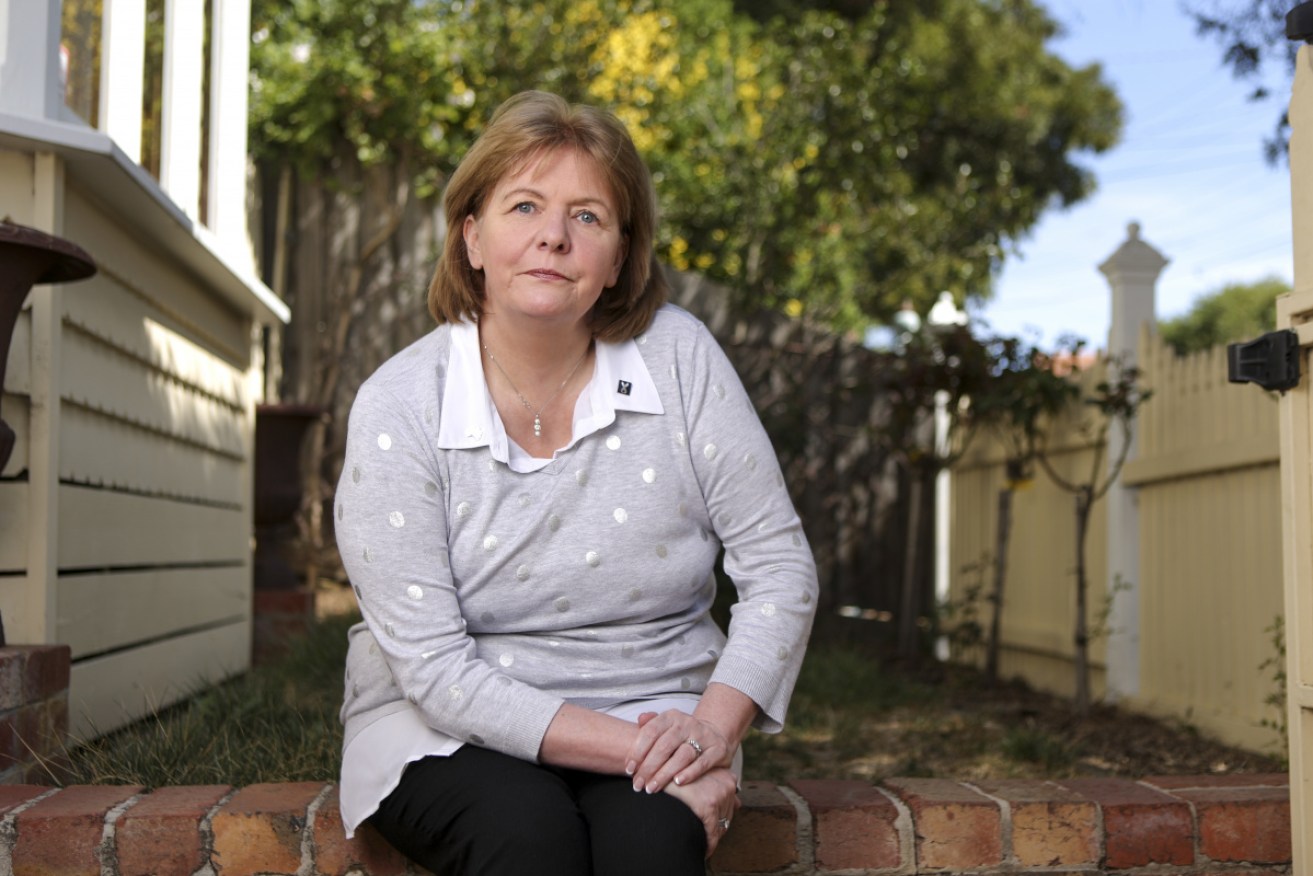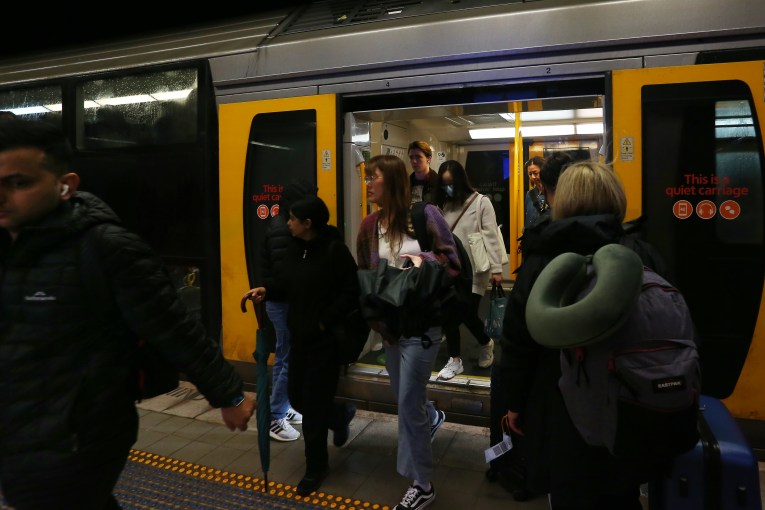‘The world stopped’: A grieving, crusading mother lives with the memories of her lost son

Carol Matthews says her beloved Sam loved their home in St Andrews, but she will never go back there. Photo: AAP
Reaching into a Union Jack flag-covered chest she calls a ‘memory box’, Carol Matthews draws out a blue-covered quilt and gently smoothes it across her dining room table.
“I haven’t got this out for four years,” says Carol, 58, smiling and crying at the same time.
The quilt, shared publicly for the first time, is the story of the life of her son Sam Matthews, a 22-year-old bank worker who died at the family’s property in rural St Andrews, 46 kilometres north of Melbourne, on Black Saturday.
Each individual patch on the quilt has a drawing done in gold pen. Carol points out some: “He was a Libran. He loved music, so here’s a guitar. His favourite band was Kings of Leon. He was a Manchester United supporter. He loved football.”
Ten years on, two beanies that Sam left in his sister Ellie’s car are still unwashed and Carol holds them while she turns the pages of photo albums put together by her son’s friends.
“Everything was lost in the fire,” she says. “This is all I have of him.”

The Matthews’ home in St Andrews before the fires. Photo: Victorian Supreme Court
From the time they emigrated from Surrey, England, in 2000 and bought their “magical place” – an 1860s homestead called Flowerdell – the Matthews family saw the potentially deadly underbelly of their rural life.
They were prepared for a fire.
Their eight hectares were cleared and bordered by other cleared properties. Carol’s husband Dave, an IT systems analyst, and Sam joined the CFA.
“Anybody who saw the house said we were in a really good defendable position,” Carol, a teacher of the deaf, says.
The family belonged to a ‘fire tree’, where every neighbour rings the next on total fire ban days, spreading news. But their “good fire plan” was based on the stay-and-defend premise at that time: ‘Houses save lives and people save houses’.
On Black Saturday, Carol and Dave, now 67, were at the family holiday house in coastal Inverloch in Gippsland. Carol rang home to St Andrews around 11.30am to see if the kids were up.
She’d been listening to the radio and had niggling weather worries. Sam told her she and Ellie had activated their fire plan, were patrolling the property and watching a website for updates.
She told her son if he saw any sign “something was going to get worse” the family would make a decision together: “He said, ‘You’re not listening to me, Mother. There’s no need for Dad to come home. There is no danger’.”
Ellie drove to work through St Andrews at 4.15pm and while there was smoke in the air “it was as still as anything”. She saw a tanker at the CFA station ready to protect the community and no roadblocks.
Half an hour later, Sam called Carol. “He sounded anxious but not in a panic. He said he thought we should come home as things could get bad here,” she says.
“Dave was straight out the door.”
She and Sam were on the phone for just 30 seconds.
“We had one tree in one of our paddocks and he said, ‘Oh my God, a tree is on fire.’ Then he said, ‘Sh-t, there’s fire all around’. It was as quick as that.”
She told Sam to get back into the house. He said he didn’t have the cats in. “Then I heard this popping,” Carol says. She realised the house windows had blown in. “That is how I knew he was dead.”
She rang Sam back “15 or 20 times” while her husband and daughter raced back to St Andrews separately. Alone at Inverloch, “I was looking around the house, saying my son is dead,” Carol says.
“I had a full-on panic attack. The world stopped.”

The Matthews home in St Andrews after the fires. Photo: Victorian Supreme Court
As it was explained to the family, on that afternoon a power line came down in Kilmore, 45 kilometres away. It coincided with a wind change. There was a spark.
“The wind picked it up and it travelled 45 kilometres in eight minutes,” Carol says.
“As an ember fell down, it sparked another fire. It jumped the Hume Freeway and in eight minutes, it killed 112 people and took 2000 houses.”
But the explanation for the fire came later.
On Black Saturday, all Carol cared about was getting to her son. She pleaded with police at a roadblock – “My baby is up there” – but wasn’t allowed into St Andrews. The next day, there was a report of a body at Flowerdell.
While she doesn’t waver in recounting Sam’s last moments, Carol compares her life now to watching a moving treadmill.
“I can see people going past on it. But every time I go to jump back on and join the world, it speeds up and leaves me behind.”

Maurice Blackburn class action lead litigant Carol Matthews on December 23, 2014 at a press conference after agreeing to a $500 million out-of-court settlement. Photo: AAP
Still, Carol has shaped the grief from her loss into a crusade, becoming an advocate for bushfire survivors. She was a lay witness at the 2009 royal commission and lead litigant in the class action that eventually saw record compensation awarded.
“The thing about the class action was as well as having to give evidence … there’s a big part of me that feels terribly guilty,” she says.
“I failed. I didn’t keep my son safe. And that is what the other side were trying to prove, so some of the questions were quite brutal.”
Carol also relentlessly campaigned for – and won – land buy back.
“I felt there were places nobody should have to be forced to build on again. People who had insurance got it only for the value of the house, not the land,” she says.
“It took three years, but we sold the land back to the government.”

A prototype of a multi-sensory ‘immersion bus’. Photo: Carol Matthews
In 2018, Carol won the Victorian Local Hero Award (“not my idea”) and is still pushing the government for a bus – with an interior that replicates firestorm conditions including smoke and darkness – that travels to fire-prone areas to teach people to “emotionally prepare” for a fire.
The Matthews family never returned to live at their St Andrews property. In their now-home in Melbourne’s Brunswick West, Carol and Dave will spend the 10th anniversary at home, remembering Sam. Black Saturday “changed my life in every single way,” she tells The New Daily.
“I put on this front but … when I come inside and shut the door, whoever that strong and brave and courageous person is disappears, and I am this person who doesn’t have a life.
“I ended up with house gone, son gone, job gone.”
The fourth time the Matthews family visited their razed home after Sam’s death, Carol was combing through debris looking for traces of her former life when she found a mug, intact.
It had Sam’s name on it. She’d bought it for him for Christmas.
“Of all the precious things of what I need reminding of my dead son, this mug would not have even been on Sam’s list,” she says.
“And now it is one of the most precious things that we have.”
Readers seeking support at this time can contact Beyondblue on 1300 224 636 or Lifeline on 13 11 14.








